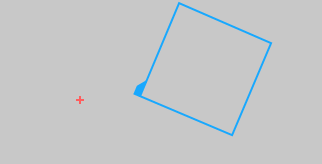You are here: Start » Function Reference » Geometry 2D » Geometry 2D Spatial Transforms » AlignPoint
| Header: | FIL.h |
|---|---|
| Namespace: | fil |
| Module: | FoundationLite |
Moves a point from a local coordinate system to the absolute one.
Applications: Required when there is a point defined in a local coordinate system, but the next image-related filter in the program does not have any inAlignment input.
Syntax
void fil::AlignPoint ( const fil::Point2D& inPoint, const fil::CoordinateSystem2D& inAlignment, bool inInverse, fil::Point2D& outAlignedPoint )
Parameters
| Name | Type | Default | Description | |
|---|---|---|---|---|
 |
inPoint | const Point2D& | ||
 |
inAlignment | const CoordinateSystem2D& | Coordinate system to align to | |
 |
inInverse | bool | Switches to the inverse transform | |
 |
outAlignedPoint | Point2D& |
In-place Processing
This function supports in-place data processing - you can pass the same reference to inPoint and outAlignedPoint
Read more about In-place Computation.
Description
AlignPoint aligns the inPoint to the inAlignment coordinate system. The input point is translated, rotated and scaled.
The inAlignment is usually a coordinate system found by some template matching algorithm.
Examples
 |
 |
AlignPoint performed on the sample point. The inAlignment is drawn on the first image in blue.
See Also
- RotatePoint – Rotates a point clockwise around a center point.
- TranslatePoint – Translates a point by a vector.
- AlignPath – Moves a path from a local coordinate system to the absolute one.


